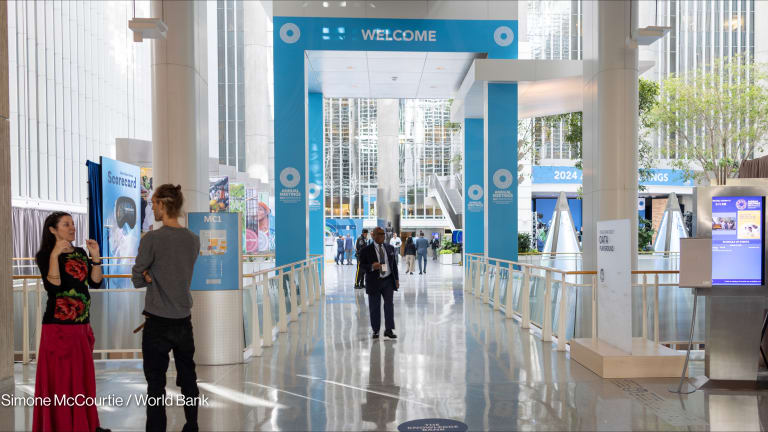World Bank 2019: How past meetings' priorities are playing out in the funding data
As the World Bank holds its 2019 annual meetings, Devex takes a look at how some of the key themes from last year have manifested in funding approvals and pipeline projects since then.
The World Bank Annual Meetings this week offer a good moment to reflect on some ways its priorities have played out in its work over the past year. Devex takes a look at how some of the key themes have manifested in funding approvals, as well as the upcoming pipeline. Fragile and least-developed countries Since 2009, the bank’s total funding commitments to projects in fragile or least-developed countries have grown, both in absolute terms and as a percentage of total approvals. In 2018, approved funding for these economies reached the highest levels in the bank’s history at nearly $17.8 billion, or 38.3% of total funding approvals for the year. So far in 2019, the bank has approved $11.8 billion for projects in these countries, including $1.13 billion to Angola, $1.16 billion to Ethiopia, and $950 million to Côte d’Ivoire. As of August this year, there remained over $51 billion in pipeline funding under consideration by the bank for fragile and least-developed countries. If just 12% of that pipeline is approved before the end of the year, the bank will meet its record again. Of that $51 billion, $21.3 billion is for projects in fragile countries. The largest country pipelines are for the Democratic Republic of the Congo ($3.8 billion), Lebanon ($3.5 billion), and Myanmar ($2.2 billion). Sectorally, Social Protection and Jobs is the largest ($3 billion), followed closely by Urban, Resilience, and Land ($2.9 billion), and Transport ($2.8 billion). The increase reflects a renewed commitment to least-developed, fragile, and conflict-affected states. During the 2016 replenishment of the International Development Association, the bank committed to doubling its resources for fragile, conflict-affected countries — a commitment that was very nearly achieved the next year, according to bank approvals data. Health, education, and the human capital index At its 2018 annual meetings in Indonesia, the bank announced the launch of the human capital index to measure health, education, and social protection policy outcomes across 157 countries. The index is intended to draw attention to human capital as an essential aspect of development. Its focus on outcomes means that meaningful changes in a country’s ranking will only be achieved after years of policy planning and implementation — any significant changes in next year’s rankings are likely to be the result of better data collection, rather than new achievements. In the shorter term, the index could influence how the bank allocates capital to health and education projects among member countries. Since those meetings, it has approved $11.9 billion in new health and education projects, with over $1 billion each for Indonesia and India. So far, there doesn’t appear to be a strong correlation between a country’s HCI score and the amount of health and education funding approved for projects there. The pipeline, however, appears to indicate a slight prioritization of countries with lower HCI scores. We will need to watch whether this correlation persists in the coming years, and how the bank’s funding decisions change as new countries collect HCI data or make progress on human capital outcomes. Digital economies in Africa Enabling the development of “secure, sustainable, and inclusive digital economies” in Africa was an important theme for the bank and its partners at the 2018 spring and annual meetings — which appears to have been borne out in its pipeline. The number and value of pipeline projects dedicated to digital development in Africa has grown substantially, from $1.3 billion in May 2018 to $2.1 billion in August 2019. These projects include various aspects of digital development, such as policy advisory work, internet infrastructure, and human capital development. Since the spring meetings, a number of relevant projects have been approved by IDA and the International Bank for Reconstruction and Development, particularly in West and Northern Africa. These include the Financial Inclusion and Digital Economy project in Morocco, the Digital Rural Transformation project in Benin, and the Digital Transformation for User-Centric Public Services in Tunisia. By a conservative estimate, more than $1 billion in projects have been approved for digital development in Africa since May 2018. Other projects related to skills training, education, and human capital are not included in that number, although these projects could contribute to Africa’s digital workforce. The International Finance Corporation has also been investing in Africa’s digital development. This includes direct equity investments in innovative African tech firms including Twiga, Kobo360, and Lulalend. It has also made indirect investments, by financing investment funds and local financial institutions — such as the TIDE Africa Fund — which in turn focuses on tech companies and local SMEs. Devex Business Insight subscribers can easily explore upcoming funding opportunities with the World Bank using our interactive tool.
The World Bank Annual Meetings this week offer a good moment to reflect on some ways its priorities have played out in its work over the past year. Devex takes a look at how some of the key themes have manifested in funding approvals, as well as the upcoming pipeline.
Since 2009, the bank’s total funding commitments to projects in fragile or least-developed countries have grown, both in absolute terms and as a percentage of total approvals. In 2018, approved funding for these economies reached the highest levels in the bank’s history at nearly $17.8 billion, or 38.3% of total funding approvals for the year.
So far in 2019, the bank has approved $11.8 billion for projects in these countries, including $1.13 billion to Angola, $1.16 billion to Ethiopia, and $950 million to Côte d’Ivoire.
This story is forDevex Promembers
Unlock this story now with a 15-day free trial of Devex Pro.
With a Devex Pro subscription you'll get access to deeper analysis and exclusive insights from our reporters and analysts.
Start my free trialRequest a group subscription Printing articles to share with others is a breach of our terms and conditions and copyright policy. Please use the sharing options on the left side of the article. Devex Pro members may share up to 10 articles per month using the Pro share tool ( ).
Matthew Wolf works with the Devex Analytics team from Johannesburg in South Africa, helping improve our coverage of and insight into development work and funding around the world. He draws on work experience with Thomson Reuters in Africa, MENA and Latin America, where he helped uncover, pursue and win opportunities with local governments and donor agencies. He is interested in data-driven solutions to development challenges, results-based financing, and ICT4D.








